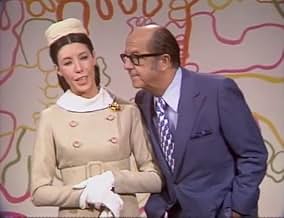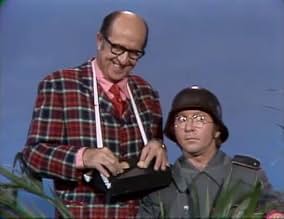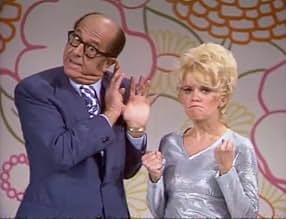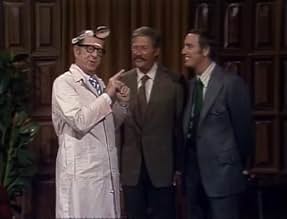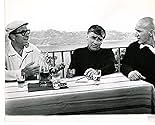Phil Silvers(1911-1985)
- Actor
- Music Department
- Soundtrack
Phil Silvers was a comedic actor of Russian-Jewish descent, nicknamed as "The King of Chutzpah." He was best known for his starring role as United States Army Master Sergeant Ernest "Ernie" Bilko in the very popular hit sitcom "The Phil Silvers Show" (1955-1959). He later had important roles in the comedy films "It's a Mad, Mad, Mad, Mad World" (1963), and "A Funny Thing Happened on the Way to the Forum" (1967), playing respectively the characters Otto Meyer and Marcus Lycus.
Silvers was a compulsive gambler, and suffered from chronic depression.
He was the 8th and youngest child to Russian-Jewish immigrants Saul Silver (alias Saul Silversmith) and Sarah Handler. Saul was a sheet metal worker who was employed in the building industry. He had helped build a number of New York City's major skyscrapers.
Silver started his career as an entertainer in 1922, at the age of 11.
A frequent accident at New York City's movie theaters was for their film projector to break down. Someone had to keep the audience entertained during repairs, so Silver was hired to sing to them. Part of his reward was to attend the movie theater free of charge.
By 1924, Silvers performed as a professional singer in the Gus Edwards Revue. His employer was theater company owner Gus Edwards (1878-1945). He then took to working in vaudeville and as a burlesque comic.
In the 1930s, Silvers started appearing in Vitaphone short films. In 1939, Silvers made his Broadway debut in "Yokel Boy." The show was considered mediocre by critics, but Silvers gained acclaim in the press. He made his feature film debut in "Hit Parade of 1941." Silvers worked primarily as a character actor over the following decades, appearing in films produced by 20th Century Fox, Columbia Pictures, and Metro-Goldwyn-Mayer. When the studio system declined, Silvers initially returned to the theater.
He had a hit as a songwriter when he composed the lyrics of "Nancy (with the Laughing Face)" (1942) for singer Frank Sinatra (1915-1998). The song was apparently named after Frank's young daughter Nancy Sinatra (1940-).
Silvers did not become a household name until his starring role in the sitcom "The Phil Silvers Show" (1955-1959). It was a military comedy, starring Ernest "Ernie" Bilko as a United States Army Master Sergeant. The character of Bilko was depicted as a con-artist and inveterate gambler who could fast-talk people into complying with his schemes. The show lasted for 4 seasons, and 144 episodes. It found further success in syndication to this very day, and often ranks high in lists of popular sitcoms.
Silvers returned to television stardom with "The New Phil Silvers Show" (1963-1964), where he played factory foreman Harry Grafton. Like Bilko, Grafton was depicted as a con-artist who owned his own company and ran many and various schemes on the side. Not as successful as its predecessor, the series lasted for a single season and 30 episodes.
Silvers enjoyed film stardom in the 1960s, though mostly playing supporting roles. He appeared mainly in American productions, although guest-starred in the British comedy film "On Follow That Came." (1967). It was the 14th film in the popular long-running "Carry On" film series (1958-1992). The film was a parody depicting life in the French Foreign Legion, and Silvers played the Bilko-like character of Sergeant Ernie Nocker. He earned a salary of 30,000 pounds, making him the highest-paid actor of the "Carry On" film series up to that point.
Silvers appeared frequently as a guest-star in then-popular sitcoms, such as "The Beverly Hillbillies" and "Gilligan's Island." In 1972, Silvers survived a stroke, although was left with permanently slurred speech. This effectively ended his theatrical career, although did not prevent him from appearing in further film and television roles.
Silvers made his last television appearance in an 1983 episode of the crime drama "CHiPs." He then went into retirement.
He died in his sleep in 1985, while in Century City, California. His family attributed the death to unspecified natural causes. He was interred at Mount Sinai Memorial Park Cemetery in Los Angeles.
Silvers is still well-remembered as a great comic actor.
In 1996, TV Guide ranked him number 31 on its 50 Greatest TV Stars of All Time list.
The Hanna-Barbera characters Hokey Wolf and Top Cat were loosely based on his screen persona.
Silvers was a compulsive gambler, and suffered from chronic depression.
He was the 8th and youngest child to Russian-Jewish immigrants Saul Silver (alias Saul Silversmith) and Sarah Handler. Saul was a sheet metal worker who was employed in the building industry. He had helped build a number of New York City's major skyscrapers.
Silver started his career as an entertainer in 1922, at the age of 11.
A frequent accident at New York City's movie theaters was for their film projector to break down. Someone had to keep the audience entertained during repairs, so Silver was hired to sing to them. Part of his reward was to attend the movie theater free of charge.
By 1924, Silvers performed as a professional singer in the Gus Edwards Revue. His employer was theater company owner Gus Edwards (1878-1945). He then took to working in vaudeville and as a burlesque comic.
In the 1930s, Silvers started appearing in Vitaphone short films. In 1939, Silvers made his Broadway debut in "Yokel Boy." The show was considered mediocre by critics, but Silvers gained acclaim in the press. He made his feature film debut in "Hit Parade of 1941." Silvers worked primarily as a character actor over the following decades, appearing in films produced by 20th Century Fox, Columbia Pictures, and Metro-Goldwyn-Mayer. When the studio system declined, Silvers initially returned to the theater.
He had a hit as a songwriter when he composed the lyrics of "Nancy (with the Laughing Face)" (1942) for singer Frank Sinatra (1915-1998). The song was apparently named after Frank's young daughter Nancy Sinatra (1940-).
Silvers did not become a household name until his starring role in the sitcom "The Phil Silvers Show" (1955-1959). It was a military comedy, starring Ernest "Ernie" Bilko as a United States Army Master Sergeant. The character of Bilko was depicted as a con-artist and inveterate gambler who could fast-talk people into complying with his schemes. The show lasted for 4 seasons, and 144 episodes. It found further success in syndication to this very day, and often ranks high in lists of popular sitcoms.
Silvers returned to television stardom with "The New Phil Silvers Show" (1963-1964), where he played factory foreman Harry Grafton. Like Bilko, Grafton was depicted as a con-artist who owned his own company and ran many and various schemes on the side. Not as successful as its predecessor, the series lasted for a single season and 30 episodes.
Silvers enjoyed film stardom in the 1960s, though mostly playing supporting roles. He appeared mainly in American productions, although guest-starred in the British comedy film "On Follow That Came." (1967). It was the 14th film in the popular long-running "Carry On" film series (1958-1992). The film was a parody depicting life in the French Foreign Legion, and Silvers played the Bilko-like character of Sergeant Ernie Nocker. He earned a salary of 30,000 pounds, making him the highest-paid actor of the "Carry On" film series up to that point.
Silvers appeared frequently as a guest-star in then-popular sitcoms, such as "The Beverly Hillbillies" and "Gilligan's Island." In 1972, Silvers survived a stroke, although was left with permanently slurred speech. This effectively ended his theatrical career, although did not prevent him from appearing in further film and television roles.
Silvers made his last television appearance in an 1983 episode of the crime drama "CHiPs." He then went into retirement.
He died in his sleep in 1985, while in Century City, California. His family attributed the death to unspecified natural causes. He was interred at Mount Sinai Memorial Park Cemetery in Los Angeles.
Silvers is still well-remembered as a great comic actor.
In 1996, TV Guide ranked him number 31 on its 50 Greatest TV Stars of All Time list.
The Hanna-Barbera characters Hokey Wolf and Top Cat were loosely based on his screen persona.



